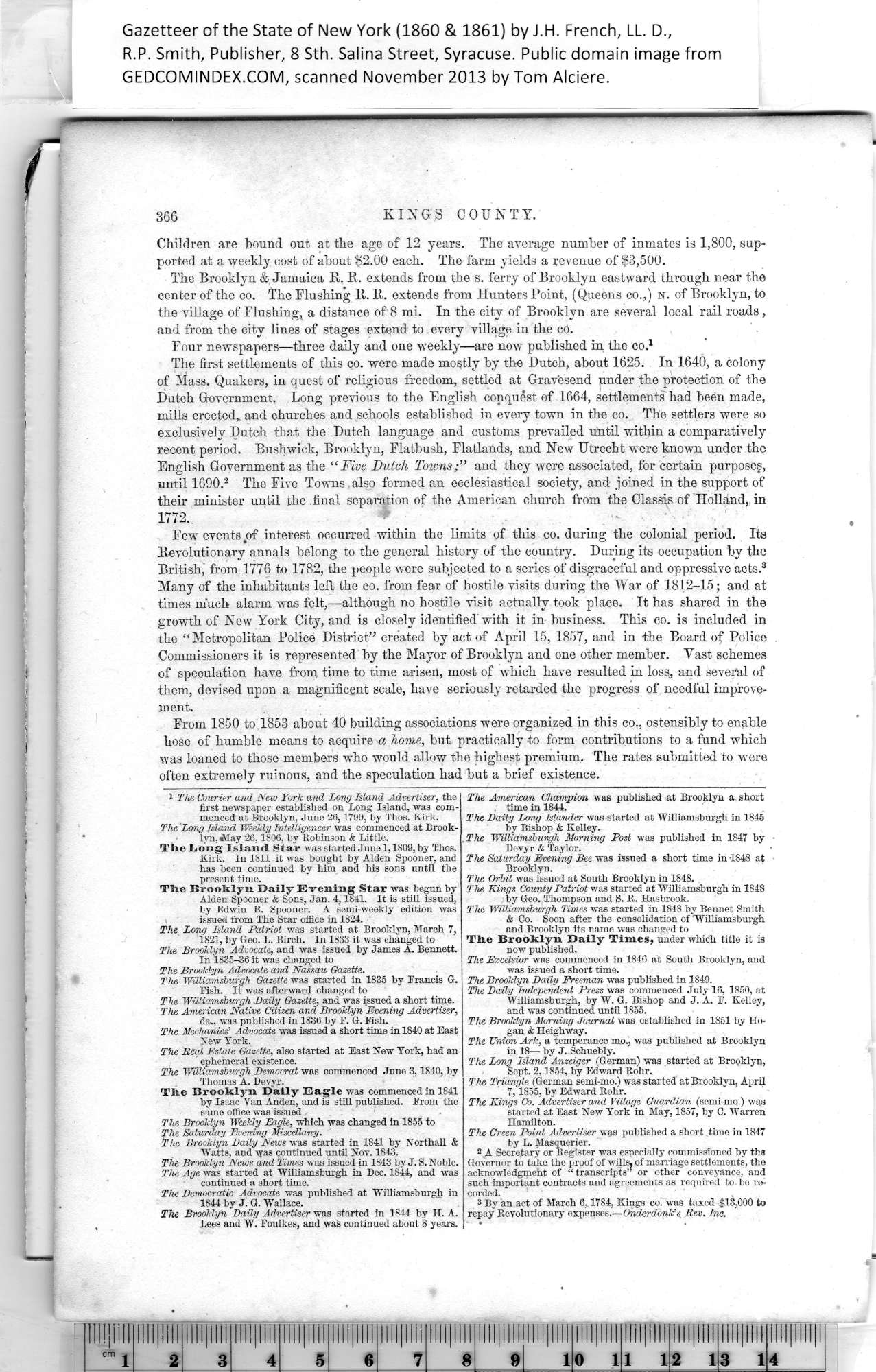|
366 KINGS COUNTY.
Children are bound out at the age of 12 years. The average number of inmates is 1,800, sup¬
ported at a weekly cost of about $2.00 each. The farm yields a revenue of $3,500.
The Brooklyn & Jamaica R. R. extends from the s. ferry of Brooklyn eastward through near the
center of the co. The Flushing R. R. extends from Hunters Point, (Queens co.,) n. of Brooklyn, to
the village of Flushing, a distance of 8 mi. In the city of Brooklyn are several local rail roads,
and from the city lines of stages extend to every village in the co.
Four newspapers—three daily and one weekly—are now published in the co.1
The first settlements of this co. were made mostly by the Dutch, about 1625. In 1640, a colony
of Mass. Quakers, in quest of religious freedom, settled at Gravesend under the protection of the
Dutch Government. Long previous to the English conquest of 1664, settlements had been made,
mills erected, and churches and schools established in every town in the co. The settlers were so
exclusively Dutch that the Dutch language and customs prevailed until within a comparatively
recent period. Bushwick, Brooklyn, Flatbush, Flatlands, and New Utrecht were known under the
English Government as the “Five Dutch Toivns;” and they were associated, for certain purposes,
until 1690.2 The Five Towns also formed an ecclesiastical society, and joined in the support of
their minister until the final separation of the American church from the Classis of Holland, in
1772.
Few events of interest occurred within the limits of this co. during the colonial period. Its
Revolutionary annals belong to the general history of the country. During its occupation by the
British, from 1776 to 1782, the people were subjected to a series of disgraceful and oppressive acts.3
Many of the inhabitants left the co. from fear of hostile visits during the War of 1812-15; and at
times much alarm was felt,—although no hostile visit actually took place. It has shared in the
growth of New York City, and is closely identified with it in business. This co. is included in
the “Metropolitan Police District’’ created by act of April 15, 1857, and in the Board of Police
Commissioners it is represented by the Mayor of Brooklyn and one other member. Yast schemes
of speculation have from time to time arisen, most of which have resulted in loss, and several of
them, devised upon a magnificent scale, have seriously retarded the progress of needful improve¬
ment.
From 1850 to 1853 about 40 building associations were organized in this co., ostensibly to enable
hose of humble means to acquire a home, but practically to form contributions to a fund which
was loaned to those members who would allow the highest premium. The rates submitted to were
often extremely ruinous, and the speculation had but a brief existence.
1 The Courier and New York and Long Island Advertiser, the
first newspaper established on Long Island, was com¬
menced at Brooklyn, June 26, 1799, by Thos. Kirk.
The Long Island Weekly Intelligencer was commenced at Brook¬
lyn, Jday 26,1806, by Robinson & Little.
TheBoiig Island Star was started June 1,1809, by Thos.
Kirk. In 1811 it was bought by Alden Spooner, and
has been continued by him and his sons until the
present time.
Tlie Brooklyn Daily Evening Star was begun by
Alden Spooner & Sons, Jan. 4,1841. It is still issued,
by Edwin B. Spooner. A semi-weekly edition was
issued from The Star office in 1824.
The Long Island Patriot was started at Brooklyn, March 7,
1821, by Geo. L. Birch. In 1833 it was changed to
The Brooklyn Advocate, and was issued by James A. Bennett.
In 1835-36 it was changed to
The Brooklyn Advocate and Nassau Gazette.
The Wiiliamsburgh Gazette was started in 1835 by Francis G.
Fish. It was afterward changed to
The Wiiliamsburgh Daily Gazette, and was issued a short time.
The American Native Citizen and Brooklyn Evening Advertiser,
da., was published in 1836 by F. G. Fish.
The Mechanics’ Advocate was issued a short time in 1840 at East
New York.
The Beal Estate Gazette, also started at East New York, had an
ephemeral existence.
The Wiiliamsburgh Democrat was commenced June 3,1840, by
Thomas A. Devyr.
Tlie Brooklyn Daily Eagle was commenced in 1841
by Isaac Yan Anden, and is still published. From the
same office was issued
The Brooklyn Weekly Eagle, which was changed in 1855 to
The Saturday Evening Miscellany.
The Brooklyn Daily News wras started in 1841 by Northall &
Watts, and was continued until Nov. 1843.
The Brooklyn News and Times was issued in 1843 by J. S. Noble.
The Age was started at Wiiliamsburgh in Dec. 1844, and was
continued a short time.
The Democratic Advocate was published at Wiiliamsburgh in
1844 by J. G. Wallace.
The Brooklyn Daily Advertiser was started in 1844 by H. A.
1
The American Champion was published at Brooklyn a short
time in 1844.
The Daily Long Islander was started at Wiiliamsburgh in 1845
by Bishop &, Kelley.
The Wiiliamsburgh Morning Post was published in 1847 by -
Devyr & Taylor.
2
The Saturday Evening Bee was issued a short time in 1848 at
Brooklyn.
3
3 By an act of March 6,1784, Kings co. was taxed $13,000 to
repay Revolutionary expenses.—Onderdonk’s liev. Inc.
Lees and W. Foulkes, and was continued about 8 years. | •
| 